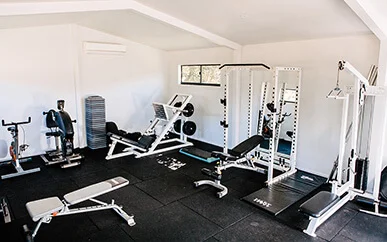Do you suffer from anxiety and/or depression? We know it can be hard to get your life back on track – but exercise is great start to trying. In fact, exercise plays an important role in your overall health, hence the saying ‘A healthy body means a healthy mind’. And exercising regularly can be effective in the treatment and prevention of anxiety and depression.
What are the benefits of exercise? How often do you need to exercise? How can it help ease symptoms of anxiety and depression? And how can you motivate yourself to exercise and maintain a routine? Read on to find out.
What are the health benefits of exercise?
Exercise provides many benefits for your physical, mental and emotional health. Some of these include:
- Greater strength, increased flexibility, and more energetic.
- Reducing fatigue and overall levels of tension.
- Preventing and improving high blood pressure, diabetes, and arthritis.
- Reducing the risk of other illnesses like heart and lung disease, obesity, cancer, and dementia.
- Improving your mood, memory, and ability to learn.
- Reducing your stress and symptoms of depression and anxiety.
- Helping you recover from a stroke and to sleep better.
- Making you feel more relaxed and positive about yourself and your life.
- Helping you to lose weight and, in turn, boost your self-esteem.
- Improving your sex life and adding years to your life.
Exercise is essential for maintaining good health, so get moving now!
How does exercise relate to anxiety and depression?
Exercise releases endorphins and serotonin; ‘feel good’ chemicals that improve your mood and take your mind off worries. Exercise also keeps your GABA and glutamate levels high, which are neurotransmitters that allow your brain to regulate emotions and some cognitive functions. So when you’re anxious or depressed, exercising can make you feel better and help you better harness your thoughts and emotions. Regular exercise can keep your anxiety or depression from returning.
Now, let’s take a closer look at how exercise can help alleviate symptoms of anxiety and depression.
Exercise and anxiety
Some of the symptoms of anxiety include: worrying or panic, nervousness, emotional volatility, tiredness, increased tension and stress and self-doubt leading to failure.
Exercise can effectively treat anxiety by reducing tension and stress, increasing your physical and mental energy, and improving well-being through the release of endorphins.
Some practical exercises you can do that suppress the symptoms of anxiety are:
- Going for long walks in the woods or on the beach; which can make you feel less anxious because nature has a calming effect on the mind.
- Yoga can also reduce your anxiety as it focuses on deep breathing, which helps to slow down and calm your mind.
- With vigorous exercise like running, you can experience an increased heart rate and shortness of breath, which are symptoms of panic attacks. But you can learn to become accustomed to fast heartbeats and overcome your fear of panic, as well as control your breathing and prevent yourself from having future panic attacks.
- Jogging in the park or taking dance classes can help you overcome anxiety by getting you out in the world and confronting your fears, and by putting you in touch with other people.
Exercise and depression
When you have depression, you feel ‘down’ or ‘blue’ for two or more weeks due to reasons like stress or even anxiety. This could cause a loss of interest for most activities, irregular sleep patterns and low self-esteem or negative thoughts. You could also feel irritable, fatigued, hopeless, or lonely.
Exercise can help fight depression by promoting changes in the brain, such as neural growth, reduced inflammation, and new activity patterns that produce calm feelings and boost well-being. Exercise also releases endorphins that make you feel good and lift your spirits. What’s more, it distracts you from your negative thoughts.
Regular exercise can further reduce stress and improve negative self-evaluations, resulting in better sleep and enhanced self-esteem. This subsequently leads to lower levels of depression and once you’re feeling better, it could prevent you from relapsing.
Here are some exercises and their positive effect on depression:
- Running can improve your mood by causing lasting changes in your ‘feel good’ neurotransmitters (eg serotonin and norepinephrine), both during and after exercise.
- Walking with a friend or joining a sports club can reduce your feelings of loneliness and isolation, which helps to both treat and prevent depression.
- Yoga’s focus on stretching, core strengthening, and breathing can also reduce depression.
How much exercise should you do?
As you can see, exercising can help you treat and prevent anxiety and depression, but how often do you need to exercise?
A general rule of thumb is to do moderate-intensity exercise (eg brisk walking) for 30 minutes or more a day, five days a week, or do high-intensity exercise (eg running) for at least 30 minutes a day, three days a week.
You don’t have to exercise for half an hour straight if you can’t or don’t want to. Instead, you can divide your exercise time; for example 15 minutes in the morning and 15 minutes at night, or you can do three 10-minute exercise sessions. As long as you’re disciplined with the actual exercise, you can choose workout timings that suit your schedule.
You can reap the health benefits of exercise if you stick with it over the long term, so make sure to do activities that you enjoy.
6 smart ways to motivate yourself to exercise
When you’re anxious or depressed, exercising becomes the last thing on your mind. But once you get motivated, exercise can help ease your symptoms. Here are some tips to help you start exercising and stay motivated:
- Do activities you enjoy – You might want to run, jog, walk, hike, cycle, dance, swim, lift weights at the gym, take a yoga class, play basketball by yourself or in a team, go canoeing with your family, or throw a Frisbee with your kids or dog.
- Choose a comfortable time and place – Think about when and where you want to exercise, eg jogging in the morning or dancing at home.
- Start small – You can start by doing low-intensity exercise (eg walking) for 10-15 minutes a day, three days a week. Then once you get used to exercising, you can increase your exercise intensity and sessions to 30 minutes or so a day, for five days a week.
- Eat a healthy diet – Eating nutrient-rich foods such as fruits, vegetables, lean meats, fish, whole grains, and dairy can boost your motivation and energy for exercise.
- Think of exercise as a priority and a lifestyle – If you think about exercise as a tool that can help you get better and as a healthy way of life, you’ll find ways to fit it in your schedule.
- Exercise with a family member, friend, pet or music – This’ll make exercising more fun and enjoyable, as well as help you stay on track.
Ready to start exercising?
Exercise is a great way to relieve symptoms of anxiety and depression. If you can stick to exercising for three to five days a week for as little as 30 minutes a day, you’ll be sure to reap the benefits. You’ll not only feel and look better, you’ll also get more out of life.
If you exercise on a regular basis but you believe symptoms are still having a negative affect, a visit to a mental health retreat could be perfect for you.
Palladium Private is a private mental health provider that tailors programs to their clients in order to facilitate their rehabilitation process. To find out more about how exercise can potentially decrease your chances of depression and anxiety, call 1300 573 095 or click here.



